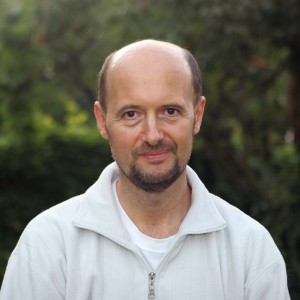 Peter Csermely is a Hungarian biochemist, and professor at Semmelweis University (Budapest, Hungary). His major fields of study are molecular chaperones and networks. In 1995, Csermely launched a highly successful initiative, which provided research opportunities for more than 10,000 gifted high school students. In 2006 he established the Hungarian National Talent Support Council, and in 2010 he started a nationwide movement for bettering the everyday work morality in Hungary.
Peter Csermely is a Hungarian biochemist, and professor at Semmelweis University (Budapest, Hungary). His major fields of study are molecular chaperones and networks. In 1995, Csermely launched a highly successful initiative, which provided research opportunities for more than 10,000 gifted high school students. In 2006 he established the Hungarian National Talent Support Council, and in 2010 he started a nationwide movement for bettering the everyday work morality in Hungary.
He wrote and edited 15 books (including the Weak Links at Springer) and published two hundred research papers with a total citation over 4,500. Dr. Csermely was the member of the Wise Persons’ Council of the Hungarian President, is a vice president of the Hungarian Biochemical Society is the past president of Cell Stress Society International, an Ashoka Fellow, was a Fogarty and Howard Hughes Scholar and received several other national and international honors and awards including the 2004 Descartes Award of the European Union for Science Communication.
1. Can you briefly describe your field of research?
I am a network scientist working with biological networks and studying their topology and dynamics in stress, adaptation, aging and disease. Fortunately different real world networks have a lot in common. Therefore in my multi-disciplinary group (www.linkgroup.hu) we always try to generalize our findings on biological networks to other systems, like social networks. This gives the opportunity to judge the importance of the discovery by determining, if the finding is valid to many types of networks. Moreover, networks help the systematic transformation of a research problem to the context of a different scientific discipline. This often solves creativity deadlocks, because the differing context may offer unexpectedly creative, novel solutions.
2. What fascinates you about cybernetics/systems research/system theory?
It is my strong belief that we can not understand the world without system level thinking. Sydney Brenner said in his Nobel Lecture: “We are drowning in a sea of data and starving for knowledge.” As Jiddu Krisnamurthy explained knowledge is information about the world, however, wisdom is our knowledge about the processes. We need more wisdom in our fast-running, vastly complex 21st century world. In science the systems level approach is our only chance to attain this.
3. Where do you see or would like to see the field heading? What changes would you like to see?
Though graph theory will be 300 years old in 2035, and sociology uses networks for almost a hundred years, comparative network studies were started only 14 years ago. This shows that there are a lot of potential still in the field. Very simple questions pose very difficult problems in network topology. How similar are two networks? What is the most important part of a network? How do you define network communities? We are at the very beginning of the exploration of network dynamics. We have not even approached colored, conditional networks of hypergraphs. Welcome, join the field!
4. What impact does your field of research have on society? What practical application for society does it have? Do you see practical applications in your own life? Can you give examples?
Biological networks teach a lot of personal examples, since they survived several billion years of crisis already. When stress comes, the yeast protein-protein interaction network develops more condensed network communities, which became more separated from each other. Those yeast cells survive the stress, which develop novel bridges between these separated communities. These bridges are formed by proteins helping survival both directly and at a systems level. We are now in an economic and social turmoil. We need these key bridges in our societies to survive.
5. What’s a scholar/writer, whose work inspires you in your own work?
When I was writing my book on networks (downloadable from here: www.weaklink.sote.hu/weakbook.html) I cited 808 papers. Hundreds of brilliant authors inspired me in systems research. Several of the brightest minds work in this field, since system thinking needs a flexibility of ideas, and an intellectual capacity to embrace hundreds of dimensions. However, as a developer of talent support networks for hundred thousands of people in Hungary (http://geniuszportal.hu/node/286), in Europe (www.TalentDay.eu) and recently in China too, I enjoy the company of the best students most. One of them, the 13 year-old Aron Perez-Lopez, who recently joined my group after having a silver medal at the Chemistry Olympiad for 18 years old, asks me questions already, which make me discover new fields.
Further Links:
Molecular Chaperone Lab at Semmelweis University



